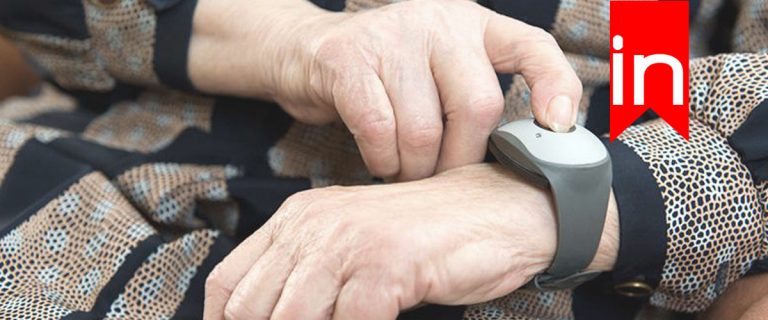With the elderly or people who are differently-abled, you may need to provide constant care and attention; however, this isn’t always a practical option for someone who isn’t a full-time caretaker, professional or otherwise.
Thankfully, with the advent of technology, devices such as personal emergency response systems or ‘PERS’, also known as medical alert systems, protect users from falls, illnesses and other emergencies, without the need for another person’s constant presence.
A person wearing an alert system is protected 24/7; all they need to do is press a button to be immediately connected with monitoring personnel (all trained professionals) who can then send help to the wearer’s location. These systems, generally in the form of cellphones, smartwatches or pendants, not only keep wearers safe but also enable independence and convenience.
However, are there medical care alert systems covered by Medicare, the federal health insurance program? Read on for a primer on all things Medicare and medical alert systems!
What Is Medicare and What Does It Cover?
As mentioned, Medicare is the United States federal health insurance program that is provided to people who are above 65 years of age, younger folks with disabilities and those suffering from permanent kidney failure, also known as end-stage renal disease, requiring dialysis or even a transplant, as well as those suffering from Lou Gehrig’s disease. Medicare is divided into 3 plans. Though these plans do not cover medical alert systems, they cover the following:- Medicare Part A (Hospital Insurance): Part A of the Medicare program covers all inpatient stays at hospitals, skilled nursing facilities, hospices and certain cases of home health care too.
- Medicare Part B (Medical Insurance): Medicare Part B is medical insurance, covering medical supplies, doctors’ services, outpatient care and any preventive services.
- Medicare Part D (Prescription Drug Coverage): Medicare Part D adds coverage of prescription drugs to certain Medicare Cost Plans, Medicare Medical Savings Accounts Plans and Private-Fee-for-Service Plans, apart from Original Medicare (both Medicare parts managed by the government).
Will Medicare Pay for Life Alert Systems?
In short – no. Medicare will not cover the cost of your medical alert. To cover medical costs you can can ask your insurance company for coverage. Or look at unmonitored medical alert systems to lower your costs.
Why Medical Alert Systems Are Beneficial

Medical alert systems provide a ton of benefits:
- Medical alert systems provide 24/7 monitoring, immediate access to emergency services and the reassurance of having trained professionals just a button’s push away.
- Medical alert systems reduce the need for hiring external help or any in-home care, or at the very least, delay it.
- These systems protect elders while maintaining their independence, privacy and freedom. These systems allow wearers to choose who can access their contact and private health information; companies that provide medical care alert systems are also bound by confidentiality agreements with their clients and are not allowed to divulge personal information.
- Some medical alert systems provide additional alerts and emergency services, such as direct contact with the fire department and police, reminders to take medicines, in-built smoke detectors and toxin-levels detection, to name a few; these can be offered at an extra cost or come included in the deal.
- Medical alert systems negate the need for carrying a phone around at all times. Even if wearers forget to take their phones with them, they can still feel protected and accessible in case of emergencies.
- These systems are not only affordable but also easy to use (just the push of a button) and easy to install. They’re also available in a range of options, such as pendants and watches, with a range of features.
- Most importantly, medical alert systems give wearers and their families peace of mind. It allows wearers more freedom, letting them live life without constantly having to worry about falls and emergencies.

Choosing a Medical Alert System
 Choosing an efficient medical alert system is essential—it can be a matter of life and death! The following factors/questions can help you while picking out a medical alert system:
Choosing an efficient medical alert system is essential—it can be a matter of life and death! The following factors/questions can help you while picking out a medical alert system:
- Features: What features do you require in your medical alert system? Though medical alert systems come equipped with many features, some of the essential features that you should look for are fall detection (1 in 4 Americans over 65 experience falls every year and are experience severe injuries), help buttons that connect to a response center with trained professionals or emergency services, monitoring of vitals, medication reminders, GPS for detecting the location and tracking, movement monitors and tracking of fitness levels and activities. Other features such as daily check-in services, phone-call features, time display and home security monitoring can also be considered.
- Kind of Equipment: The type of equipment should also be considered for the wearer’s convenience and comfort. Is the equipment wearable, sans any sharp edges or potential irritants for delicate skin? Is it fully waterproof? Is it obtrusive or unobtrusive? What is its functional range? Does it work indoors and outdoors? How loud is the speaker and how long does the battery last? Is it easy to set up and install? Does it come in a watch form? Or a necklace or bracelet?
- Mode of Functioning: You’ll want to consider whether the medical alert system is “monitored” or “non-monitored”; the former is a direct connection to the response center whereas the latter dials numbers that wearers designated, such as neighbors, family members or emergency services. Also, check the efficiency and quality of the response center in the case of monitored systems—what their response time, whether the center is certified, what languages the professionals at the response center can communicate in and if the response center is owned by the company providing the system or an external party. Ensure that your information is protected and safe from any cybersecurity threats.
- Cost: The cost, as with all products, is a must consider. Thoroughly check pricing plans for any hidden details, avoid long-term contracts, ensure there are good guarantee and cancellation policies offered, what tax deductions you can avail, and if any discounts are available. Also, check if any insurance policies cover the costs of the system.
Saving on Medical Alert Systems
While buying medical alert systems, the following tips can help you save:- Scope out all your options but be clear about what you want and need. Don’t get tricked into buying a system with more features than you need; you’re going to end up paying more than you had initially planned to.
- Always compare costs. Most companies let you lease their equipment and charge you anywhere between $50-200 in setup fees and between $30-60 as monthly fees.
- Ensure you read through the contract, pricing plans, warranty deals and cancellation process thoroughly.
- Look for 24/7 customer care and not just 24/7 emergency response services.
- Look for companies that offer 30-day trials or money-back guarantees.
- Look for special deals and discounts that are offered by companies.


LifeCall is an American company with a long history of providing excellent monitoring services and efficient emergency alert systems to health care facilities catering to the elderly and individuals for use both indoors and on the go all over the United States.
Call Now
1 (866) 225-1295
Read The Review






